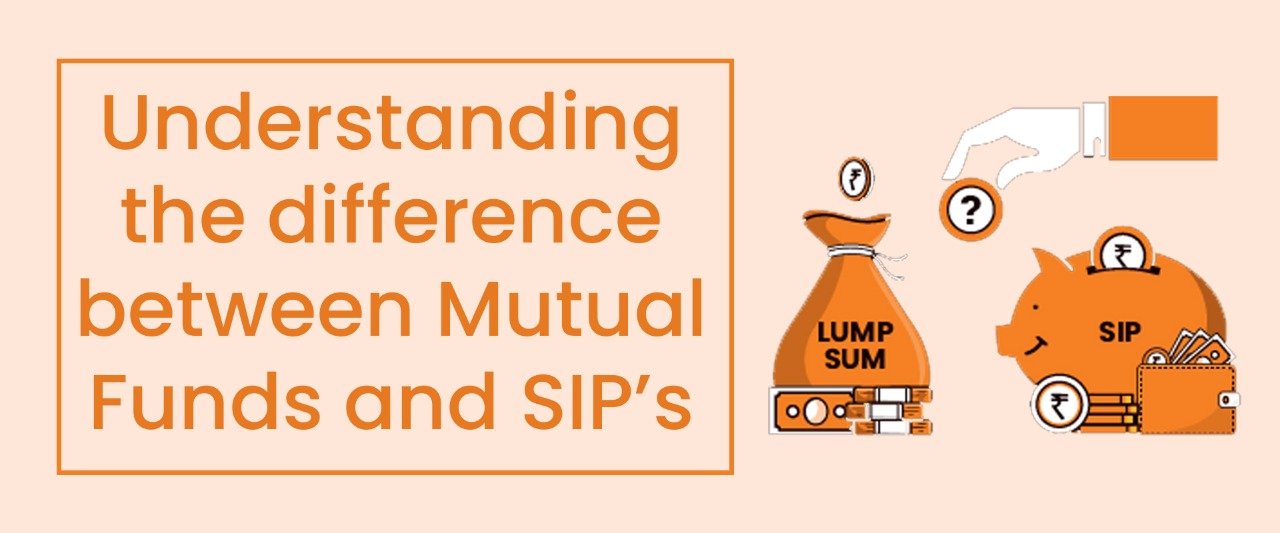
Understanding the difference between Mutual Funds and SIP’s
A lot of individuals falsely think that a SIP and mutual funds are mutually exclusive investments. You must understand that a SIP, or systematic investment plan, is nothing more than a regular and disciplined mutual fund investment. A pool of assets created by a professional fund manager is known as a mutual fund.
A pool of equity assets, debt assets, a mix of equity & debt, or liquid assets are the alternatives open to you as an investor. A mutual fund gives its investors proportional ownership, which they can sell at any time unless there is a lock-in due to tax rules. Let's understand the differences between SIP and mutual funds to determine which is preferable. Let's initially focus on these two ideas before moving the discussion of mutual funds vs. SIP in India ahead.
What is a Mutual Fund and SIP respectively?
A Mutual Fund investment is a collection of assets in which you buy units to get a portion of the ownership. These may be purchased both online and offline and are quite liquid. A mutual fund is designed to provide you with the advantages of risk diversification. Your personal ability to invest in shares is limited by your financial resources. By purchasing mutual funds, you may diversify your investment and lower your risk at the same time. You also bear the responsibility for professional management because the mutual fund manager is an expert with a plethora of collective market knowledge and a skilled staff at his disposal.
On the other hand, the SIP is just a way to invest in a mutual fund. You have the choice to reinvest in mutual funds either all at once or over time. The full form of SIP is Systematic Investment Planning. It enables you to invest systematically, and depending on your preferences, it may be weekly, monthly, or quarterly. However, the monthly format is the most widely used way to invest in SIP since it also allows you to match your mutual funds with your inflows. SIP offers you some unique benefits when investing in mutual funds because it is more in line with your income flows and offers the advantage of rupee cost averaging (RCA).
SIP is merely a tried-and-tested method for investing in mutual funds, particularly equity funds.
What are the unique advantages that an investor gets from SIP?
SIP is a method of investing a specific amount on a regular basis at predetermined intervals of week, fortnight, or month in a mutual fund plan (often an equity or ELSS scheme). It is comparable to conventional saving plans like a recurrent deposit at a bank or a post office. Here are a few of the main benefits of using SIPs as a method of investing in mutual funds.
By making regular, periodic investments over an extended period of time, it is a tried and tested strategy of lowering risk while still earning significant returns. Even in unpredictable markets, spreading out your investment over a longer period of time usually results in the best pricing. Although you may not have caught the market's bottom, you are as near as you can get.
Rupee cost averaging, which is nothing more than spreading out your investments over the length of a financial year, is made possible through SIP. You may reduce volatility by averaging your purchasing costs. Through equity SIPs, Indian families invest close to Rs. 11,005 crore per month. That is how well-liked it has grown to be.
It most importantly inculcates financial discipline in your life. You are compelled to view investing as a discipline and managing spending as a surplus expense. That is how money and savings are created, and mutual fund SIP is precisely aligned with that process.
In India, mutual funds have developed into a true savings pool for small and medium-sized investors. Through investing in stocks, they may save money, build wealth, and enjoy the advantages of professional management. As previously said, SIP is only a tool of a wiser and more economically sensible method of investing in mutual funds.